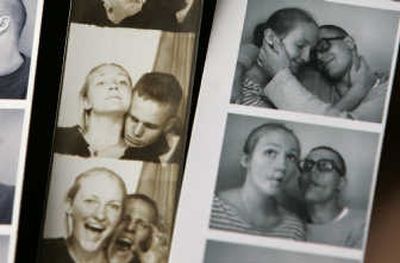Family doubts stories about Marine’s death

LAKE STEVENS, Wash. – On the afternoon of March 23, two superiors took a 21-year-old Marine, Lance Cpl. Dustin Canham, into a tent at Camp Lemonier, a U.S. base in the rocky desert of the Horn of Africa.
Exactly what happened inside remains unclear, except this: Canham died.
In letters, the Marines told Canham’s family he collapsed while exercising. His father and his 19-year-old widow believe that’s half the story. They were told by Canham’s fellow Marines that he was being punished for accidentally chipping another Marine’s tooth. They suspect he might have died from being forced to work out too hard.
A military autopsy determined the manner of death to be “natural” and said Canham had a mildly enlarged heart. But the medical examiners were not told the circumstances of Canham’s death and thus did not consider heat exhaustion as a possible cause.
After the Associated Press raised questions last week, Armed Forces Medical Examiner Craig T. Mallak and the deputy medical examiner who performed the autopsy, Cmdr. Timothy D. Monaghan, told the family they would take another look at Canham’s case.
“They try to make it sound routine, but there’s nothing routine about taking one Marine aside,” said Canham’s widow, Devyn. “Why wouldn’t they be doing their daily exercises together?”
The AP has also learned that one of the two superiors who brought Canham into the tent, Sgt. Jesus Diaz, was reassigned following the death.
A spokeswoman at Marine Corps headquarters declined to comment, citing the continuing investigation, as did representatives of the Naval Criminal Investigative Service, which is conducting its own inquiry.
Canham, 21, of Lake Stevens, Wash., had arrived at Camp Lemonier, in the African nation of Djibouti, about a week earlier. The U.S. maintains the 500-acre base for its Combined Joint Task Force-Horn of Africa.
None of Canham’s platoon mates would comment when contacted by the AP. But some did speak with Devyn, telling her that earlier in the day, Dustin was unloading a truck with other Marines when they began joking around and throwing rocks at each other. Dustin chipped another Marine’s tooth, she said.
Shortly before 4 p.m., Diaz and Abril brought Canham into a tent. Dustin soon collapsed; other Marines saw Diaz run out of the tent to get help, Devyn said. He was pronounced dead at the camp’s medical clinic at 5:12 p.m.
One letter to the family, written by Lt. Col. J.R. Hill of the 6th Engineer Support Battalion, said, “Dustin was in his air-conditioned quarters while exercising when he unexpectedly collapsed,” and added that “the Marines who found him” immediately called for help.
Another, written by Lt. Col. Thomas E. Foos, commanding officer of 8th Provisional Security Company, and Capt. Craig E. Harris, commander of Alpha Company at Lemonier, said, “Dustin was exercising with his fire team leader in his tent …”
None of the letters explained why Canham was in the tent with two superiors. Devyn Canham said three Marines told her it was not Dustin’s own tent, but another that might not have been air-conditioned. The temperature that afternoon neared the mid-90s.
Dustin’s father, Mark Canham, said an investigator confirmed to him that Dustin was doing physical training in lieu of receiving a black mark on his record when he died. Devyn said no military officials have told her that.
The autopsy report makes no mention of Canham exercising; it says that he collapsed while in his quarters. Canham’s heart weighed 450 grams, at the top of the normal range.
The medical examiner listed the cause of death as a thickening of the left ventricular wall, a condition sometimes found in endurance athletes. Canham was in excellent shape, his family said.
“His enlarged heart and hypertrophic left ventricular wall left him vulnerable to disruption of life-sustaining cardiac rhythms,” Monaghan said.
Heat exhaustion can cause such a disruption.
Dr. Allen Burke, director of the Kernan Hospital Pathology Laboratory at the University of Maryland, provided a consultation for the autopsy. He agreed with the finding about Dustin’s heart condition, but said examination did “not disclose an anatomic cause of death.”
Mark Canham has spent the past two months trying to contact his son’s friends in the Marines, investigators and members of Congress to pry loose any information he can.
“I just want to know what happened,” he said. “I wish I could let the whole thing go. But that would be a grave injustice to my son.”